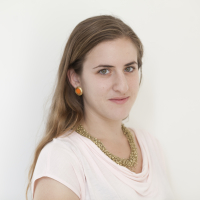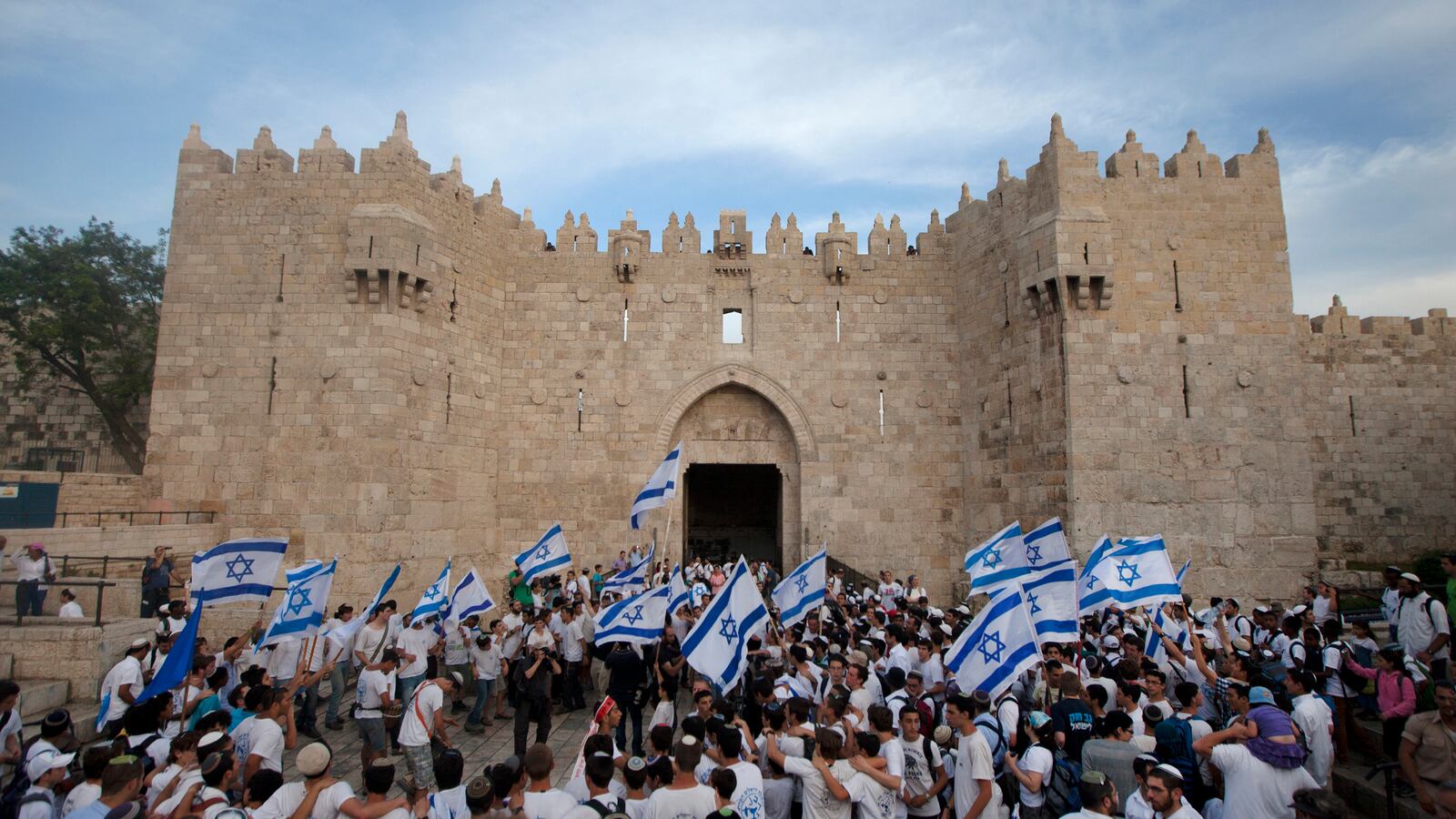My building's Arab gardener comes to work every morning from Shouafat, a refugee camp outside of Jerusalem where he's lived for over 30 years. This morning, when I came back from my run, I said good morning and asked him what he thought of "al-Quds day." He quickly corrected me: "Yom Yerushalayim," he said. "Allah Kareem." And in those four words, he had said it all: Jerusalem is a hot, complicated mess, but God is generous—and we should be too.

As I made my way to the Old City of Jerusalem, the site of the Holy Sepulcher, Ahram Al-Sharif, Al-Aqsa Mosque, and the Western Wall, I knew what I would find. I knew because it's well-documented. And I knew because of the death-stares and laughs my friend was getting (he held a sign that read: "Israelis and Palestinians refuse to be enemies"). And I knew because I grew up in this scene: Bnei Akiva, Jerusalem Day, the Kotel. I thought I knew what it would look like and how I would feel. I was wrong.
I arrived at Damascus gate, where most male marchers, with matching shirts and chants, began their march. I had arrived just after an event that likely looked much like another one from last year. Protest, violence, arrests, and clearing out Palestinians so that these marchers could carry on.I got the story of what happened from two sides. Micky Rosenfeld, the foreign press spokesman for the Israel Police, got to me first. He explained that there had been an unscheduled and uncoordinated Palestinian protest where "one hundred and fifty Palestinians decided to have a riot." When it came to a point where Palestinians were "attacking the police officers and disturbing the peace," he said, the authorities stepped in and arrested fifteen people to "clear up the area for the coordinated march." (There are reports confirming that a total of 23 Palestinian were arrested along with 13 arrests of Israeli youth.)
The more vivid details of the rumble came from a friend of mine who was a part of the Palestinian protest. The first thing she told me was that every year the Palestinians hold a protest, though she did not know whether there had been any attempt to coordinate with the army (it seems fair to suggest that any request for a permit would have been denied). She said that things started to "heat up" after a young boy was arrested—the police came in wearing riot gear and on horseback. In her words, they "assaulted people and to pushed them back into East Jerusalem"—all the way to Salah a-Din street, where they were held for the duration by police barriers and prevented from returning to West Jerusalem. My friend was only able to get out, she said, because she has a Jewish-Israeli sounding name.
I sat on the steps leading to Damascus gate which leads to the Muslim Quarter pondering the events I had just missed. I was witnessing the aftermath—a couple more gruesomely violent arrests of Palestinians and activists, teenage boys chasing them and screaming unimaginative curses (always my favorite: "death to leftists"). Next to me on the steps was a large group of Yeshiva students singing about Zion and Jerusalem. These men were having a religious moment in this place that had, moments ago, seen sickening piece of systematic violence—it gave me the shivers.
And when I caught up with that same Yeshiva later (they had stopped to sing again in a shadowy alley in the Muslim Quarter on the way to the Western Wall), I felt the same way. Weirdly disconnected from my own religion that I love. I spoke with some of the wives who had come along with their husbands. They were pushing strollers, sporting headscarves, and they were likely very close to my age. They were happy to talk to me about their understanding of Jerusalem Day: a day of "mini-Redemption" in which "everyone comes together, in a world in which there are no barriers, no walls." No Walls? "Well, yes, the Arabs have walls. But they have a problem: they don't understand that this is ours. We need to kick them out." These conversations didn't help my nausea. This was not, I thought, the generosity God had in mind.
There are long lists of how the city of Jerusalem systematically discriminates against its Arab minority. According to the Association for Civil Rights in Israel (ACRI), there are some 370,000 Palestinians living in East Jerusalem—or some 39 percent of the population. And yet are 10 municipal preschools in East Jerusalem—and in West Jerusalem there are 77 (despite a law that mandates free education to children ages 3 to 4). There are 42 Post Offices in West Jerusalem; East Jerusalem has 9. And here's what always gets me: Between 2005 and 2009, West Jerusalemites were granted 87 percent of all housing permits in the city; Palestinians (who average 12 meters of housing space per resident to Israel's 20) only got 13 percent. The list goes on.
Systematic discrimination is important to talk about and to fight. The structures involved should be identified, campaigns should be built to fight them, and resources should be allocated to win them. But when the whole religious Zionist world converges in a racist orgy—from high schools, youth groups and Yeshivot to the youth movements of Bnei Akiva, Ezra and Ariel—we need to talk about people, and to people. It's not just the kids from the tough, violent settlements like Itamar, Elon Moreh and Beit El. There were groups there from Eilat, Ashkelon, and Be'er Sheva. They came by the busload from every corner of the country—including liberal South Jerusalem—singing "O Redeemer, come to Zion." Someone needs to remind them: Allah Kareem. God is good, and kind, and generous. And loves all people.





